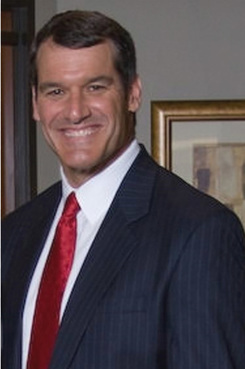Appellate Lawyer of the Week: Houston Attorney Uses Criminal Law to Reverse Med Mal Defense Win
Texas tort reform laws have made it extremely tough for medical malpractice plaintiffs to prevail in Texas civil courtrooms.
January 18, 2018 at 06:27 PM
4 minute read
 Robert J. Killeen Jr.
Robert J. Killeen Jr. Texas tort reform laws have made it extremely tough for medical malpractice plaintiffs to prevail in Texas civil courtrooms.
So Houston attorney Robert Killeen used a tactic normally used in criminal law litigation to convince an appellate court to reverse a take-nothing judgment against a heart surgeon and remand his plaintiff client's med mal case for a new trial.
Killeen represents Carolyn Jackson, who sued heart surgeon Daniel Garber Stroud for medical malpractice after her husband died from complications related to heart bypass surgery. Jackson is African-American and Stroud is Caucasian.
During jury selection, one of four black panelists was struck for cause. And at the conclusion of jury selection, Stroud used his peremptory strikes to remove the three remaining black panelists.
Jackson then made a Batson challenge—named after the 1986 U.S. Supreme Court decision in Batson v. Kentucky, which stands for the proposition that a prosecutor's use of peremptory challenge in a criminal case may not be used to exclude jurors based solely on their race.
But the trial court overruled Jackson's Batson challenge and no black panelist was seated on the jury. The jury later returned a defense verdict and the trial court signed a take-nothing judgment against Jackson.
Jackson appealed the judgment to Houston's First Court of Appeals arguing that the trial court abused its discretion in overruling her Batson challenge because Stroud's purported reasons for striking the black panelists were pretexts for unlawful racial discrimination.
Yet Stroud contented on appeal that the trial court properly overruled Jackson's Batson challenge because she failed to prove purposeful discrimination.
In their decision, the First Court focused on Stroud's decision to strike a black panelist, P. Howe, because she worked as a certified nursing assistant. Stroud argued in his appellate brief that Howe was struck because a CNA position requires little education and her employment in the health care field would lead her to presume expertise in medical malpractice.
But the appellate court concluded that Stroud's explanations for striking Howe were unpersuasive because he didn't bother to question Howe about his concerns during jury examination.
“The record shows that Stroud failed to ask panelist Howe any questions related to his belatedly-expressed concerns about her education, her willingness to decide the case based on the evidence rather than her experiences, or her ability to follow an instruction from the trial court to refrain from informing jurors of special medical knowledge she has acquired during her career,” wrote Justice Harvey Brown.
The decision reverses the defense win and remands the cases for a new trial, noting, “We have no reason to doubt that the attorney responsible for the challenged peremptory strikes is 'pure of heart,' and we assume that he is.”
Killeen, who represented Jackson both at trial and on appeal, said he was prepared for filing and defending his Batson challenge even though they are rarely lodged in civil cases in Texas.
“It's incredibly unusual,” Killeen, a partner in Killeen & Stern, said of the Batson challenge. “Our firm does a lot of criminal work and from my perspective, not a lot of civil lawyers know how to handle a Batson challenge in a civil trial.''
Having all of the African-American jurors struck from the panel was extremely problematic for his African-American client—something the First Court has now corrected, Killeen said.
“It's a tremendous decision. It's extremely well laid out by the First Court,'' Killeen said of the ruling.
Donald S. Stephens, a Pearland attorney who represents Stroud, said his client has not decided whether to appeal the First Court's decision.
“We're disappointed by the decision but we look forward to the resolution of the case,'' Stephens said.
This content has been archived. It is available through our partners, LexisNexis® and Bloomberg Law.
To view this content, please continue to their sites.
Not a Lexis Subscriber?
Subscribe Now
Not a Bloomberg Law Subscriber?
Subscribe Now
NOT FOR REPRINT
© 2025 ALM Global, LLC, All Rights Reserved. Request academic re-use from www.copyright.com. All other uses, submit a request to [email protected]. For more information visit Asset & Logo Licensing.
You Might Like
View All
Federal Judge Approves Harvard's Dismissal of Chip-Patent Suit Against Samsung
2 minute read
O'Melveny, White & Case, Skadden Beef Up in Texas With Energy, Real Estate Lateral Partner Hires
5 minute read
Chamberlain Hrdlicka Taps a New Leader as Firm Follows Succession Planning Path
3 minute read
Trending Stories
- 1Morgan Lewis Says Global Clients Are Noticing ‘Expanded Capacity’ After Kramer Merger in Paris
- 2'Reverse Robin Hood': Capital One Swarmed With Class Actions Alleging Theft of Influencer Commissions in January
- 3Hawaii wildfire victims spared from testifying after last-minute deal over $4B settlement
- 4How We Won It: Latham Secures Back-to-Back ITC Patent Wins for California Companies
- 5Meta agrees to pay $25 million to settle lawsuit from Trump after Jan. 6 suspension
Who Got The Work
J. Brugh Lower of Gibbons has entered an appearance for industrial equipment supplier Devco Corporation in a pending trademark infringement lawsuit. The suit, accusing the defendant of selling knock-off Graco products, was filed Dec. 18 in New Jersey District Court by Rivkin Radler on behalf of Graco Inc. and Graco Minnesota. The case, assigned to U.S. District Judge Zahid N. Quraishi, is 3:24-cv-11294, Graco Inc. et al v. Devco Corporation.
Who Got The Work
Rebecca Maller-Stein and Kent A. Yalowitz of Arnold & Porter Kaye Scholer have entered their appearances for Hanaco Venture Capital and its executives, Lior Prosor and David Frankel, in a pending securities lawsuit. The action, filed on Dec. 24 in New York Southern District Court by Zell, Aron & Co. on behalf of Goldeneye Advisors, accuses the defendants of negligently and fraudulently managing the plaintiff's $1 million investment. The case, assigned to U.S. District Judge Vernon S. Broderick, is 1:24-cv-09918, Goldeneye Advisors, LLC v. Hanaco Venture Capital, Ltd. et al.
Who Got The Work
Attorneys from A&O Shearman has stepped in as defense counsel for Toronto-Dominion Bank and other defendants in a pending securities class action. The suit, filed Dec. 11 in New York Southern District Court by Bleichmar Fonti & Auld, accuses the defendants of concealing the bank's 'pervasive' deficiencies in regards to its compliance with the Bank Secrecy Act and the quality of its anti-money laundering controls. The case, assigned to U.S. District Judge Arun Subramanian, is 1:24-cv-09445, Gonzalez v. The Toronto-Dominion Bank et al.
Who Got The Work
Crown Castle International, a Pennsylvania company providing shared communications infrastructure, has turned to Luke D. Wolf of Gordon Rees Scully Mansukhani to fend off a pending breach-of-contract lawsuit. The court action, filed Nov. 25 in Michigan Eastern District Court by Hooper Hathaway PC on behalf of The Town Residences LLC, accuses Crown Castle of failing to transfer approximately $30,000 in utility payments from T-Mobile in breach of a roof-top lease and assignment agreement. The case, assigned to U.S. District Judge Susan K. Declercq, is 2:24-cv-13131, The Town Residences LLC v. T-Mobile US, Inc. et al.
Who Got The Work
Wilfred P. Coronato and Daniel M. Schwartz of McCarter & English have stepped in as defense counsel to Electrolux Home Products Inc. in a pending product liability lawsuit. The court action, filed Nov. 26 in New York Eastern District Court by Poulos Lopiccolo PC and Nagel Rice LLP on behalf of David Stern, alleges that the defendant's refrigerators’ drawers and shelving repeatedly break and fall apart within months after purchase. The case, assigned to U.S. District Judge Joan M. Azrack, is 2:24-cv-08204, Stern v. Electrolux Home Products, Inc.
Featured Firms
Law Offices of Gary Martin Hays & Associates, P.C.
(470) 294-1674
Law Offices of Mark E. Salomone
(857) 444-6468
Smith & Hassler
(713) 739-1250






